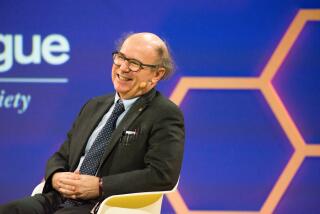Great Scientists Are the Ones Who Ask the Best Questions
- Share via
Why? Why? Why?
Some scientists are pesky as kids, always wanting to know “Why?”
Why this? Why here? Why now? And who ordered that?
Why is the sky blue? Why does time flow forward? Why is there a universe at all?
Even the seemingly simplest questions can set them off. Try answering the “blue sky” question, for example, with the standard explanation: The sky is blue because molecules in the atmosphere scatter the blue wavelengths of sunlight more readily in our direction than the redder rays. (The leftover red rays sneak through, reaching us from clear across the Earth at sunset.)
They’ll probably just ask: Well, why do the molecules scatter blue more readily than red?
If you answer that (the reason has to do with the nature of light and the structure of atoms), they’ll probably ask: Well, why is light the way it is? And why are atoms structured the way they are?
In recent years, the physicists’ whys have gotten more and more outrageous. Twenty years ago, I heard the great MIT physicist Victor Weisskopf lecture to a high school class about the “big bang”--the beginning of the universe. One student asked him what happened before the big bang? Why did it bang?
Weisskopf responded that the “why” of the big bang fell outside the realm of science.
Today, the study of why the universe banged into existence is a major question in cosmology. Indeed, one of its leading practitioners, Alan Guth, is the Victor Weisskopf professor of physics at MIT. Guth’s seminal theory of inflation is really about the tremendous expansion of space that took place before the big bang, and the creation of the stuff that banged in the first place.
“The question of the origin of the matter in the universe,” says Guth, “is no longer thought to be beyond the range of science.”
Cambridge physicist Steven Hawking has taken the question even further. “Why,” he asks, “does the universe go to all the bother of existing?” Cosmologists aren’t the only ones asking prying questions of nature. Particle physicists spend billions of dollars to find out why protons weigh what they do, why electrons exist, and why the universe is made of matter in the first place.
This insistent digging for deeper truth is not idle theorizing. Often, finding out “why” opens doors to new discoveries.
For example, Newton figured out that the force of gravity is proportional to an object’s mass. (In other words, the bigger they come, the harder they fall.) But his theory contained no explanation for this fact.
“The gravitational force in Newton’s theory might have depended for instance on the size or shape or chemical composition of the body,” notes University of Texas physicist Steven Weinberg in his book “Dreams of a Final Theory.”
Einstein’s theory of gravity, on the other hand, explained why gravity and mass are related. He showed that gravity is the warping of space-time by matter. Mass creates the warpage that we call gravity. And explaining gravity as the curvature of space-time led to the discovery of a host of exotic phenomena--including black holes.
These days, some physicists believe they’ve gone even further in unraveling the “why” of gravity. So-called “string theory,” which explains everything about the universe in terms of vibrating 11-dimensional strings, actually requires gravity. A stringy 11-dimensional universe must have gravity. So string theory supplies the answer to the “why” of gravity’s very existence.
As you probably guessed, however, other physicists are asking: Why strings? Why 11 dimensions?
Even if someone finds a final theory, says Weinberg, it will not explain everything. We’ll still have to ask “Why is there anything at all? . . . In however attenuated a form, I think the old question--Why?--will still be with us.”
That’s a good thing for science, because asking “why” is just as important to progress as getting an answer. Maybe even more so. As Einstein put it: “The formulation of a problem is often more essential than its solution.”
Weisskopf likes to talk about his old friend and mentor, Niels Bohr, the “father” of quantum mechanics--the theory behind the structure of the atom. Comparing Bohr to a prototypal present-day Nobel laureate, Weisskopf remarked that Bohr was a better scientist. The present-day physicist, he said, is brilliant. He has an answer for everything.
But Bohr was the true genius, he said. “He had a question for everything.”





